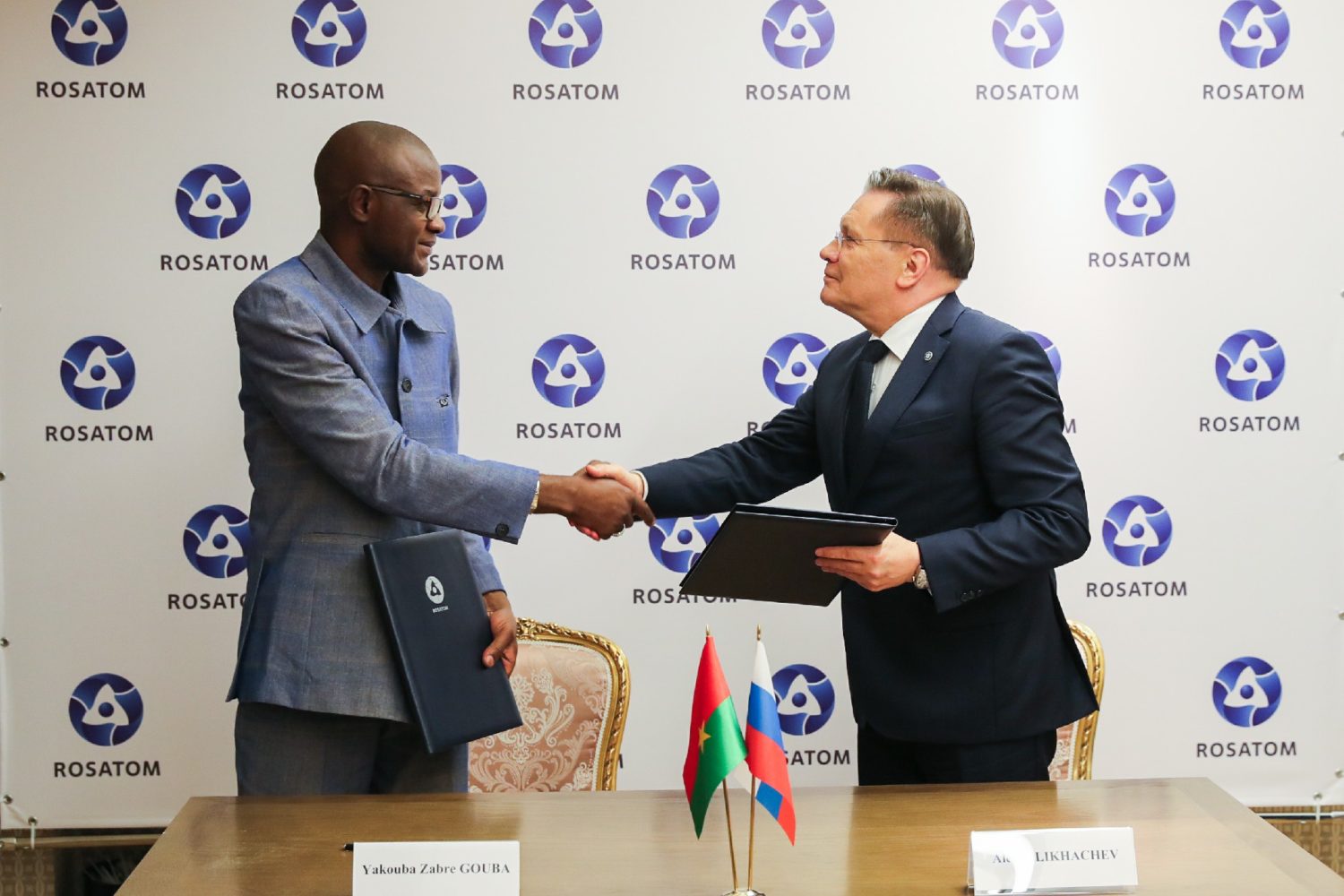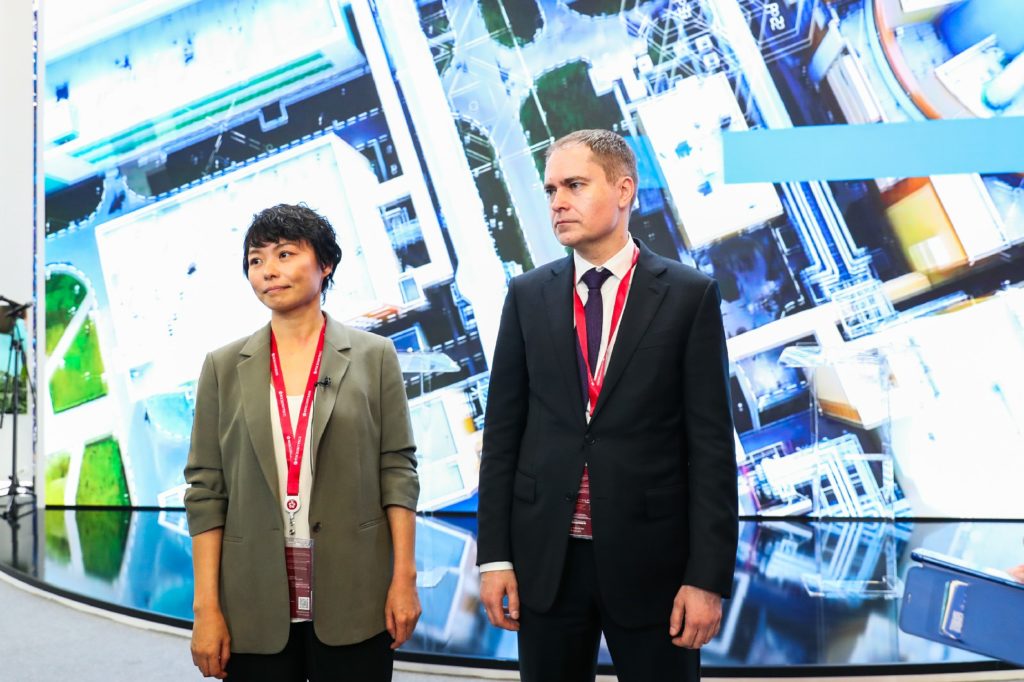
SPIEF 2024: International Cooperation Up and Running
back to contentsRosatom signed several international agreements at the Saint Petersburg Economic Forum (SPIEF 2024), while its managers held talks with key stakeholders and participated in the forum sessions to discuss building new economic ties. Despite the unprecedented sanctions pressure, the Russian nuclear corporation continues to expand cooperation with the international community.
Agreements
Rosatom Director General Alexey Likhachev and Burkina Faso Minister of Energy, Mines and Quarries Yacouba Zabré Gouba signed three memorandums. The first of them pertains to the training of staff for the nuclear power sector. The parties will develop ties between specialized educational institutions, organize short-term training courses and upskilling programs for teachers, publish educational and academic literature, and exchange students. The purpose of these arrangements is to train staff for the yet-to-emerge nuclear industry in Burkina Faso.
The second memorandum aims to assess and develop nuclear infrastructure in the country. This is planned to be done in compliance with the IAEA guidelines and Rosatom’s best practices. The third document is intended to promote a positive public attitude to nuclear power and raise public awareness among the people of Burkina Faso on the advantages of nuclear technology, including the use of nuclear in medicine and agriculture.
Rosatom’s power engineering division and its partners from the Republic of Guinea signed a memorandum of intent to build floating power units to supply electricity to the country. The parties will consider the possibility for the country to use offshore generation facilities with field-proven and efficient RITM‑200 reactors, and set out the terms and conditions of the project. “Power shortage is a daunting challenge for the African region, so we see our mission in providing our partners with fast, reliable and environmentally friendly solutions. The memorandum we signed is testimony to the high interest in our technologies from the global community,” said Vladimir Aptekarev, Deputy Head of Rosatom’s Mechanical Engineering Division.

Rosatom and the Chinese shipping company Hainan Yangpu NewNew Shipping Co. Ltd have signed an agreement of intent to establish a year-round container line between the ports of Russia and China via the Northern Sea Route. The agreement includes the creation of a joint venture for designing and constructing high-ice class container ships and the joint operation of the Arctic container line. “We see an increasing interest in the NSR from our Asian partners. NewNew Shipping completed seven voyages via the NSR last year, and we expect up to 12 trips this year,” said Vladimir Panov, Rosatom Special Representative for Arctic Development.
Negotiations
Alexey Likhachev met with Hungarian Minister of Foreign Affairs and Trade Péter Szijjártó. “Hungary has been working together with the Russian Federation on nuclear for decades. We are satisfied with this cooperation. Without nuclear power, we would not be able to supply our country safely with electricity,” Péter Szijjártó said at a briefing after the meeting. He recalled that nuclear energy accounts for half of electric power produced in Hungary, while nuclear fuel for the country’s only nuclear power plant in Paks is supplied from Russia. “In case of a sanctions regime against nuclear fuel, this would make it absolutely impossible to supply our country with electricity safely. Therefore, it is not only that we do not support sanctions on nuclear, but we are interested in further improving our nuclear cooperation with Russia simply because it is in our national interest,” the minister concluded.
The Director General of Rosatom also met with Bolivian President Luis Arce. They discussed cooperation in peaceful uses of nuclear energy and joint projects in the lithium segment. Alexey Likhachev told President Arce about the progress in the construction of the Nuclear Research and Technology Center in Bolivia’s El Alto and reaffirmed plans to complete all its facilities within the scheduled time.
Sessions
Speaking at the Russia-Latin America session, Vadim Titov, CEO of Rusatom International Network (part of Rosatom), noted that the cooperation between the Russian nuclear corporation and Latin American countries was expanding across many dimensions. “Rosatom has been present in Latin America for years, offering a wide range of technologies and solutions. We supply nuclear power plants in Brazil and Mexico with uranium for fuel, and see the prospects for broader cooperation in the energy sector. We are also active in Bolivia where we are building a nuclear research and technology center and working on lithium projects,” Vadim Titov said. Nuclear medicine is one of Rosatom’s priority businesses in Latin America. Last year, its isotope exports increased 15 %, including through supplies to the countries of the region.
Establishing contacts with new international partners was one of the key topics at the SPIEF. This is an area in which Rosatom has also gained extensive competencies and capabilities, operating in 60 countries around the world and running local offices in many of them. The people who work there understand local context and know key stakeholders, and Rosatom is ready to share this infrastructure with its partners. “We see ourselves as a global integrator of advanced solutions for a better life of individuals, nations and our planet. We do not think of our work as pure business. For us, first and foremost, it is a cooperation based on respect and equality, and we generously share our knowledge and technology,” Kirill Komarov, First Deputy Director General Corporate Development and International Business at Rosatom, said at the Technology Horizon: Non-Commodity Export Models session.
Alexey Likhachev: “Technology and science will not become a driver for the fundamental development of mankind without moral values as the third dimension. I believe that the world should be ruled by the idea of equality — not in the vulgar meaning compromised by socialism or communism, but in the sense of creating fair and equal conditions for the development of people and maximizing their talents. This idea is relevant for young people in Europe, Asia, Africa and Russia.”




